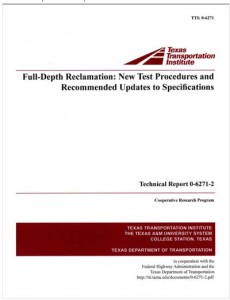PB2012113592
Full-Depth Reclamation: New Test Procedures and Recommended Updates to Specifications.
Report produced in 2012 by the Texas Transportation Inst., College Station.
Personal authors: Scullion, T.; Sebesta, S.; Estakhri, C.; Harris, P.; Shon, C. S.
Information on authors can be found at: http://tti.tamu.edu/group/pavements/people/
 Rehabilitating an old pavement by pulverizing and stabilizing the existing pavement is a process referred to as Full Depth Reclamation (FDR). The stabilized layer becomes either the base or sub-base of the new pavement structure. This process has been used widely for over 20 years in Texas to strengthen and widen structurally inadequate pavement sections. This project developed guidelines on successful FDR practices, developed training materials, and identified areas where improvements to current practices are required. To improve the FDR process, this report includes the following enhancements: Current laboratory testing to select the optimal type and amount of stabilizer takes too long and requires too much material. Continue to run parallel testing with the small sample test protocols proposed in this report. Use the falling weight deflectometer (FWD) during construction to validate that the design assumptions are being met. Implement the proposed bond test to select the optimum prime material and amount needed to effectively bond the base to the surfacing materials. Modify the specifications to avoid working in freezing conditions. Consider implementing the other modifications to specifications proposed in this report.
Rehabilitating an old pavement by pulverizing and stabilizing the existing pavement is a process referred to as Full Depth Reclamation (FDR). The stabilized layer becomes either the base or sub-base of the new pavement structure. This process has been used widely for over 20 years in Texas to strengthen and widen structurally inadequate pavement sections. This project developed guidelines on successful FDR practices, developed training materials, and identified areas where improvements to current practices are required. To improve the FDR process, this report includes the following enhancements: Current laboratory testing to select the optimal type and amount of stabilizer takes too long and requires too much material. Continue to run parallel testing with the small sample test protocols proposed in this report. Use the falling weight deflectometer (FWD) during construction to validate that the design assumptions are being met. Implement the proposed bond test to select the optimum prime material and amount needed to effectively bond the base to the surfacing materials. Modify the specifications to avoid working in freezing conditions. Consider implementing the other modifications to specifications proposed in this report.
This report is one of many featured in the January 2014 issue of the National Technical Reports Newsletter, which may be viewed online at http://www.ntis.gov/pdf/NTRNews6-7.pdf. For your convenience, previous issues of the newsletter are posted at http://www.ntis.gov/rss/Ntrnews.aspx.
This issue features a sampling of new and historic information available from NTIS via the NTRL V3.0 and the NTIS website related to the topic of Recycling